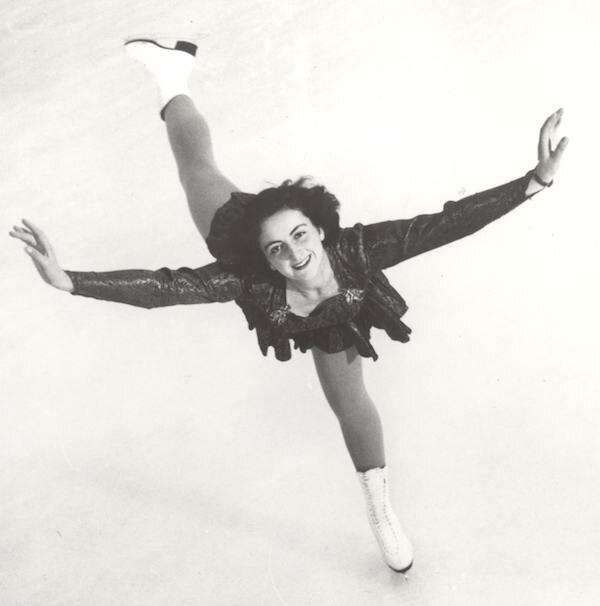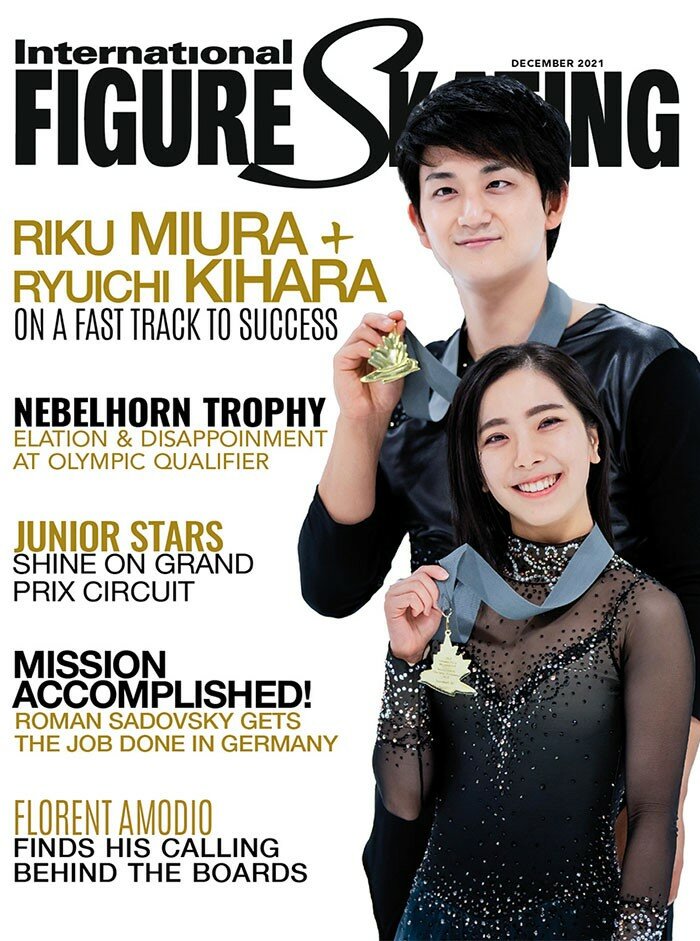

Shortly after Great Britain’s Jeannette Altwegg claimed the 1952 Olympic title, she retired from the world of competitive skating. Declining all professional skating offers, Altwegg instead retreated to the Swiss village of Trogen, where she took a low-paying position at the Pestalozzi Children’s Village looking after child refugees for a year.
In 1953, on the recommendation of Sir Winston Churchill, Altwegg was made a Commander of the Order of the British Empire in acknowledgement of her contributions to figure skating. That same year, Altwegg married Marc Wirz, the brother of Suzanne Wirz, the 1952 Swiss champion. The couple had four children before divorcing in 1973.
For almost six decades Altwegg declined all interview requests, stating a desire for privacy. All that changed when the organizers of the 2011 European Championships extended an invitation to Altwegg to attend the gala in Bern, Switzerland. She accepted.
When asked why she had walked away from a lucrative professional career, Altwegg explained it was because of an injury. “I messed up my knee in my last year of competing and at that time they were not able to operate on it as they are now. So that is why I stopped skating. In a way it is good to stop when you are at your peak. It is nice that you don’t go on and on.”
Attending a skating event in her adoptive homeland after so many years was a pleasure, Altwegg said. “But, oh my goodness, you have to be a mathematician to understand it all now. I am happy I do not have to bother with puzzling over the marking. It is all so complicated. It is lovely to sit back and enjoy it all. Skating has taken on a whole new life. For me the artistic side has been the biggest change of all. In comparison, we were just sort of lumbering around in our day.
“I think that the International Skating Union found a good compromise in the ice dance discipline. Introducing the short dance was a very good idea and I think it is a lovely idea that skaters are now awarded the small medals.”
Coached by Jacques Gershwiler, she rose steadily through the ranks, claiming the 1947 national junior title and four consecutive senior crowns (1948-51).
A master of compulsory figures, Altwegg is still considered one of the best technicians of all time. At the 1952 Olympic Winter Games, the school figures gave her a commanding lead over America’s Tenley Albright and Sonya Klopfer. Though she placed fourth in the free skating portion, Altwegg mined gold, with six of the nine judges ranking her first. “I suppose figures were rather boring,” Altwegg said. “They took up hours and hours, and I do not think it was beneficial for the free skating portion, because with figures we were always stiff and the free skate should be loose. I think that era is over.”
The late John Noel recounted Altwegg’s compulsory figures in his Olympic diary from those Games: “Miss Altwegg had the bad luck to lose some screws from the heel of her skate just after her rocker, an accident which might have had unfortunate results had it happened two minutes earlier. She was, of course, quite superb, and throughout the figures was clearly in a class by herself. Such figures have never been seen since the days of Cecilia Colledge, and several times I wondered whether even Cecilia was quite like this.”
Born in Mumbai, India on Sep. 8, 1930 to a Swiss father and an English mother, Altwegg was raised in Lancashire, England. Though skating was her passion, she also excelled at tennis and was the runner-up at the 1947 Wimbledon junior final.
Altwegg recalled her first Olympic adventure in St. Moritz in 1948, where she claimed the bronze medal behind Canada’s Barbara Ann Scott and Austria’s Eva Pawlik. “Everyone just came and nobody knew anyone else,” she said. “There was no village or anything. Everyone booked their own hotels. We asked ourselves things like, ‘What are we going to wear?’ It was really lovely. It really was special.”
The following year she placed third at Worlds in Paris, ranked second at the 1950 World Championships in London and claimed the global title in Milan in 1951. Altwegg repeated that pattern at Europeans, claiming bronze in Milan in 1949, silver in 1950 and gold in Zurich in 1951. Just eight days prior to the opening of the 1952 Olympic Winter Games she defended her European title in Vienna.
On a bitterly cold February day in 1952, 30,000 people were on hand at Oslo’s outdoor Bislett Stadium to watch Altwegg claim Olympic gold. Her victory brought much-needed cheer to England, a nation grieving the sudden death of its beloved monarch, King George VI, two weeks earlier.
“The funny thing is that I really enjoyed skating outdoors,” Altwegg recalled. “In Oslo, for example, that northern air was something special. And when the music started it gave one shivers. Then there was this nice clean sheet of ice that made one think, ‘Oh, how lovely is this.’ But on the other hand, I now ask myself how on earth did I ever do that.”
Altwegg’s victory was the first in Olympic figure skating for Great Britain in 44 years (Madge Syers claimed gold in 1908). She is the only British woman to have ever won two individual figure skating medals at an Olympic Winter Games. It would be 24 years before Altwegg’s countryman John Curry claimed Britain’s next Olympic crown at the 1976 Games.
Altwegg said her life has been consumed with family and other interests the past 59 years. “I have a big family with four children and 13 grandchildren. My family has been and is my career,” she said. “I play golf. It does not matter what level I am at with whatever it is, I always like to challenge myself.”
Her daughter, Christina Wirz, was a member of the Swiss curling team that won the World Championship in Moose Jaw, Sask. in 1983. “She said she wanted to do everything I did,” Altwegg explained with a laugh.
“The nicest part now is that I dream sometimes that I am doing quadruple jumps,” Altwegg said with a wide smile. “I sort of get up there and ask, ‘How many do you want?’ Sort of arrogant, you know. Because when you are in it your dreams can be nightmares. You lose your skates or your music stops in the middle of your program.”
Inducted into the World Figure Skating Hall of Fame in 1993, Altwegg passed away on June 18, 2021 at age 90.



